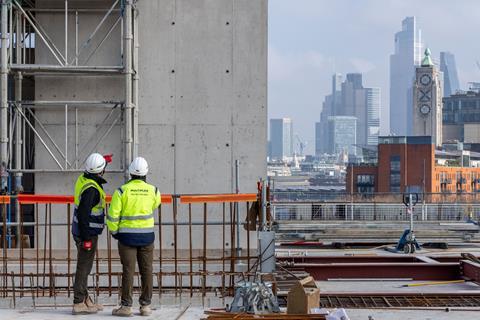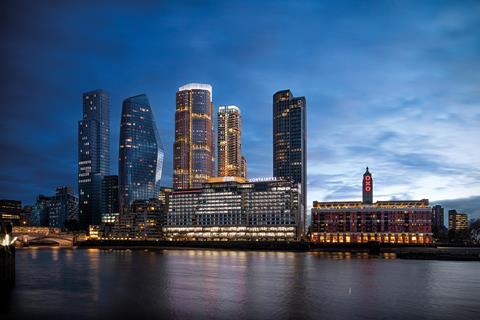It is not good for anyone that some of the sector’s most high-profile projects are bid by just two firms, writes Dave Rogers
Earlier this week, I was sitting on top of the No 63 bus, which runs all the way down London’s Farringdon Road from the Mount Pleasant sorting office to Blackfriars station.
There were a few sites that it trundled past. One – the redevelopment of Smithfield market into the new home of the Museum of London – was being carried out by Sir Robert McAlpine. All the others, of which there were four, were being carried out by Mace and Multiplex.

The No 63 crosses Blackfriars Bridge and heads down towards Southwark Tube station. Multiplex is building the Bankside Yards scheme on the left and a bit further down the road on the other side is a vacant plot behind the Mad Hatter hotel and pub.
Empty for more than a decade, this is the site of the planned 18 Blackfriars development, an enormous, three-towers scheme that is being developed by Hines and run by Lipton Rogers. It will cost £1bn to build.
This week, ��ɫ����TV revealed the firms bidding the job which, leaving the enabling works to one side, has been split into separate office and residential contracts.
Currently, jobs in London involving a tower and a big price tend to end up being bid by just those two firms
The office scheme is the bigger and has a £600m price tag for a 47-storey tower. There are two bidders: Multiplex and… no, not Mace, which is a surprise because, this year, it has been tempting to think that if, one doesn’t get such and such a job, then the other one will.
Currently, jobs in London involving a tower and a big price tend to end up being bid by just those two firms. Lendlease would normally bid as well but, since May, its future has been less certain after the decision by its Australian parent to sell up.
So, the fact that Lendlease is indeed the other firm on the shortlist for 18 Blackfriars is a good thing for Lendlease but also, as things stand, something of a worry. Some clients have expressed reservations about asking Lendlease to price jobs because of the uncertainty about its future.
In the autumn, Multiplex replaced Lendlease as the preferred contractor to build out CO-RE’s ITV Studios redevelopment which is – still – waiting on final sign-off from a High Court judge. But the tender was re-run because the developer wanted a plan B.
Who did Multiplex beat? Mace, of course.
>> See also: Core Five flags up worries over who will build major projects
>> See also: Is the City set for a new tower boom?
Losing ITV must have stung Lendlease and underlined why its former boss, Simon Gorski, said in the summer that a deal needed to happen quickly. If the uncertainty goes on for too long, then staff and clients melt away – that is the gist of what he said. To get on the 18 Blackfriars shortlist, then, must have been a shot in the arm for the business.
But Lendlease, which is moving into temporary offices next month, has not been bought yet. So, right now, Multiplex is up against a firm that is still up for sale, the outcome of which is not known. It is a legitimate question to ask how much effort trade contractors will put into pricing packages for a firm whose bid could be felled at any moment if a buyer for it is not found.
Market gossip suggests that a deal for Lendlease is more likely, than not – with rumours that it will come early in the new year – but, then again, is this just a hope?
Let us assume that Lendlease is bought. One obvious question is: would the new owner want it bidding a £600m tower? It might be a two-stage deal, but at some point, the winning contractor is going to have to fix its price and tell the client that this is what it thinks it can build it for. Being just 1% out on a job of this size would cost £6m.

Mace looked at the job – of course it did – but backed away because of the risk. As well as the office tower, there are two other two towers – of 45 and 25 storeys – going up at a site with limited and awkward access. It is a logistical challenge, without a doubt.
Mace wanted the job let as a construction management contract, privately suggesting that a job at that cost is too much of a risk to fix a price on. Funders might want certainty on jobs this size and that stands to reason; but contractors are not obliged to price their jobs in return. And, if one of the two who would normally be prepared to do that does not, then options for funders and clients look thin on the ground.
Now let us assume that Lendlease does not get bought. What then? Does Multiplex get a free ride, or does Mace get persuaded to take another look? Would it want to? Presumably, terms would have to change.
Clients, and their consultant teams, are already fretting about who can build the really big commercial schemes

Why does any of what happens at 18 Blackfriars matter? It matters because clients – and Mace and Multiplex – need Lendlease to stick around. It is good for competition, keeps people on their toes and means there might be more than one bidder for those really big jobs in the future.
Clients, and their consultant teams, are already fretting about who can build the really big commercial schemes – those that are competitively tendered and let as design and build – over £250m.
The pool has been dwindling over the years. Skanska, builder of the Gherkin and the Heron Tower, hardly appears on any shortlists for these jobs now. Laing O’Rourke, builder of the Cheesegrater, has all but disappeared from the London commercial market.
McAlpine? Yes, it is building a big tower at Broadgate for British Land, having worked on several others under a framework agreed in 2015, but it is difficult to recall when it recently bid a design and build job alongside Mace and Multiplex. It wants CM, it seems.
There are plenty of very big jobs to come: 1 Undershaft, the British Library extension, a swathe of towers planned for Gracechurch Street, the redevelopment of Liverpool Street station.
There is a wider systemic issue about risk here and what is acceptable – and no company in their right mind will load up on risk so much that it might topple them. But the more immediate issue for funders, developers and consultants seems to be this: Mace and Multiplex cannot build everything.
Dave Rogers is deputy editor of ��ɫ����TV


























No comments yet